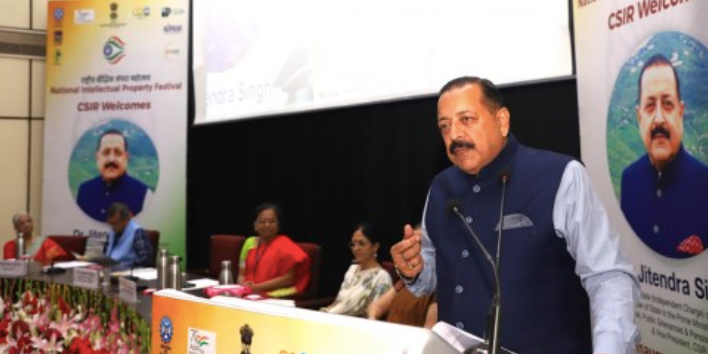The ‘StartUps Intellectual Property Protection’ (SIPP) scheme aims to promote innovation and entrepreneurship in India, according to Union Science and Technology Minister Jitendra Singh. Speaking at the ‘National Intellectual Property Festival’, Singh highlighted the importance of filing Intellectual Property Rights (IPR) such as patents and trademarks for startups, as well as establishing industry linkages to encourage innovation and enterprise in the country.
He also noted that under the leadership of Prime Minister Narendra Modi, the government has reduced the trademark registration process from over a year to just one month. Additionally, Singh asserted the ‘StartUps Intellectual Property Rights Protection’ scheme, which offers an 80% rebate in patent filing fees and a 40%-50% rebate for the industry and companies.
He emphasized that PM Modi has launched various schemes to support the startup ecosystem and enhance capacity building. Singh highlighted India’s progress in the Global Innovation Index, where the country has jumped 31 places to rank 40th. He also mentioned India’s rapid rise in the global startup ecosystem, reaching the third position in just a few years.
Jitendra Singh has also emphasized the importance of merging the digital repository of traditional knowledge and heritage with modern scientific innovation. By establishing a formalized mechanism for this integration, he believes that sectors such as Khadi, Aroma Mission, and Lavender cultivation can gain a competitive advantage.
This suggests that by combining traditional practices and knowledge with modern scientific advancements, these sectors can enhance their productivity, efficiency, and overall success. The digital repository would likely serve as a platform for storing and accessing traditional knowledge and heritage, while also facilitating collaboration and innovation with modern scientific techniques.
The mention of Khadi, Aroma Mission, and Lavender cultivation specifically implies that these sectors have the potential to benefit significantly from the amalgamation of traditional knowledge and modern scientific innovation. Khadi refers to hand-spun and hand-woven cloth, which is a traditional Indian textile. Aroma Mission likely pertains to the production and utilization of aromatic plants and essential oils. Lavender cultivation, on the other hand, refers to the farming and processing of lavender plants.
By leveraging traditional knowledge and heritage alongside modern scientific advancements, these sectors can potentially develop unique and high-quality products. This integration may lead to increased market demand, improved product quality, and sustainable practices, ultimately giving them a competitive edge in their respective industries. Singh concluded by stating that India is now an equal partner with other nations in technology application and is on par with the developed world in areas like quantum computing.
During this period, the SIPP scheme aims to provide financial support to startups for the protection of their intellectual property rights. The scheme covers the costs associated with filing and processing patent, design, and trademark applications. The assistance is provided through IP Facilitators, who guide startups through the entire process of filing and processing their applications.
These facilitators are appointed by the Office of the Controller General of Patents Designs and Trademarks. By providing financial support for IP protection, the government aims to encourage startups to invest in research and development and promote innovation and creativity. This, in turn, helps startups to safeguard their inventions, designs, and brands, giving them a competitive edge in the market.
The SIPP scheme has been successful in increasing the number of IP filings by startups since its launch. The extension of the scheme until 2023 reflects the government’s commitment to supporting startups and promoting a culture of innovation in the country. Overall, the SIPP scheme plays a crucial role in protecting and promoting the intellectual property rights of startups in India and fostering an environment conducive to their growth and success.
(Author: Trilok Singh, pursuing Ph.D. in Journalism and Mass Communication from K R Mangalam University. MA in Journalism and Mass Communication from Galgotias University. MA in Political Science from Kirori Mal College, University of Delhi. CEO at Post A2Z, IASmind and Youth Darpan).

























Add Comment